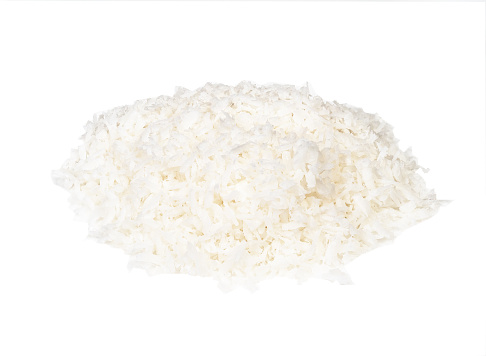Using a Florapower oil press is an efficient and sustainable method of producing high-quality coconut oil. With this technique, all the valuable nutrients and flavors of the coconut can be preserved to obtain a high-quality product.
Oil extraction process: become a coconut expert!
Due to its high percentage of saturated fatty acids (approx. 90%), coconut oil is solid at room temperature, which is why it is also called coconut fat. Nevertheless, since it has a low melting point, it becomes liquid around 23°C.
Coconut oil is taken from the copra, the endosperm of the coconut. This is crushed, dried and then pressed in oil mills using a mechanical pressing.
If the oil is to be used as a cooking fat, then it undergoes refinement and deodorization after production.
Valuable properties of coconut oil
Coconut oil has a white to yellowish color.
It smells waxy, faintly oily, fresh and mild with a light note of coconut. It is even often somewhat rancid-smelling.
Concerning taste, the oil tastes like coconut. Coconut oil at room temperature is a solid plant oil whose melting point lies around 18 to 25°C, whose smoke point is approx. 194°C and whose flash point lies around 288°C.
If coconut is stored in a cool location, it has a shelf life of 1 to 2 years, due to its high percentage of saturated fatty acids.
Use of coconut oil / coconut fat
Coconut oil in pharmacy and medicine
Coconut oil has antibacterial and anti-inflammatory properties that make it an effective remedy in medicine. It is used for skin care, wound healing and even disease prevention. Coconut oil is used to make ointments and creams and also serves as a substitute for expensive cocoa butter.
Coconut oil in cosmetics – a popular beauty product
In addition to its health benefits, coconut oil can also be used externally to care for the skin and strengthen the hair. Coconut oil is also used here, although it only has a low penetration capacity into the skin. It has a moisturizing effect and a cooling effect. It is often found as an additive in products such as hair pomades and care products, sun protection creams and after-sun products, bath and massage oils and in creams and soaps.
Coconut oil – effective in technology
In technology, coconut oil is used as a lubricant for machines and engines. Its high heat resistance and viscosity make it a sustainable alternative to conventional lubricants. It is used in the confectionery industry for its cooling effect in the production of ice cream, wafer fillings and coatings. It is also used in the manufacture of vegetable margarine and chocolate and in the production of candles.
Coconut oil – coconut fat is a must-have in the kitchen!
In the kitchen, coconut oil can be used as a normal cooking fat for frying, baking or deep-frying. When it melts, it absorbs a considerable amount of heat, which produces a distinct cooling effect in the mouth and is therefore used in the production of ice cream confectionery. Rasped copra is also used in the confectionery industry. In Germany, a pure coconut fat containing hardened or partially hardened fats is sold under the name “Palmin”. However, there is also “Palmin soft”, which does not contain any hydrogenated fats. However, unlike palmin, it consists of a mixture of sunflower oil, palm kernel oil and palm oil.
The coconut fat press cake, which is a by-product of oil extraction, serves as a valuable source of sugar, protein and minerals for the production of animal feed.
We will be happy to advise you on this seed and show you options. Contact us
In addition to their own knowledge acquired through press trials, the following sources were used to create the article:
- Öle, natürlich kaltgepresst, Basiswissen & Rezepte, Marcus Hartmann, Hädecke, 2008
- Heilende Öle, Pflanzenöle als Nahrungs- und Heilmittel, Neue Erkenntnisse, Günter Albert Ulmer Verlag Tuningen
- Lexikon der pflanzlichen Fette und Öle, Krist, Buchbauer, Klausberger, SpringerWienNewYork, 2008
- www.wikipedia.de
- en.wikipedia.org


